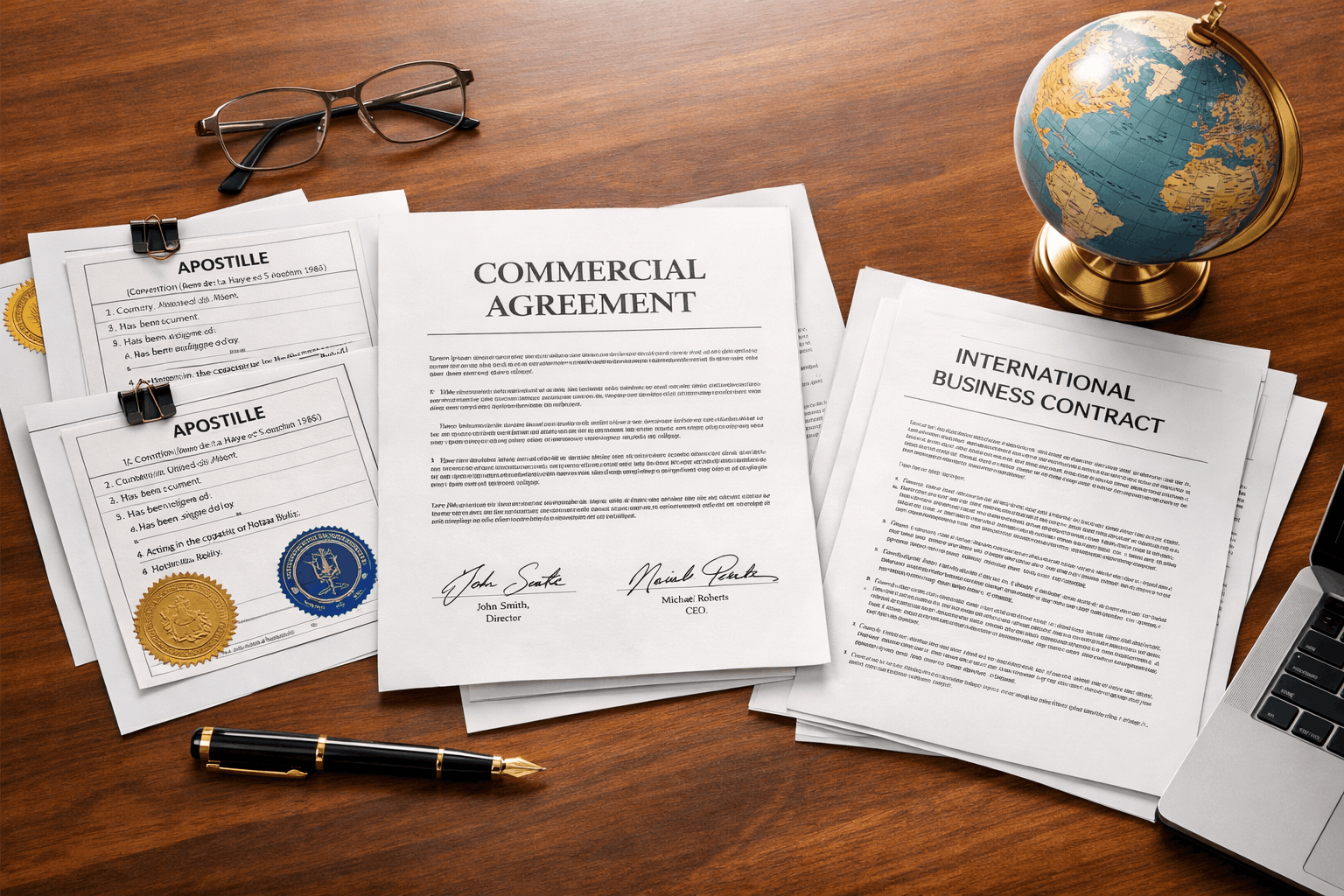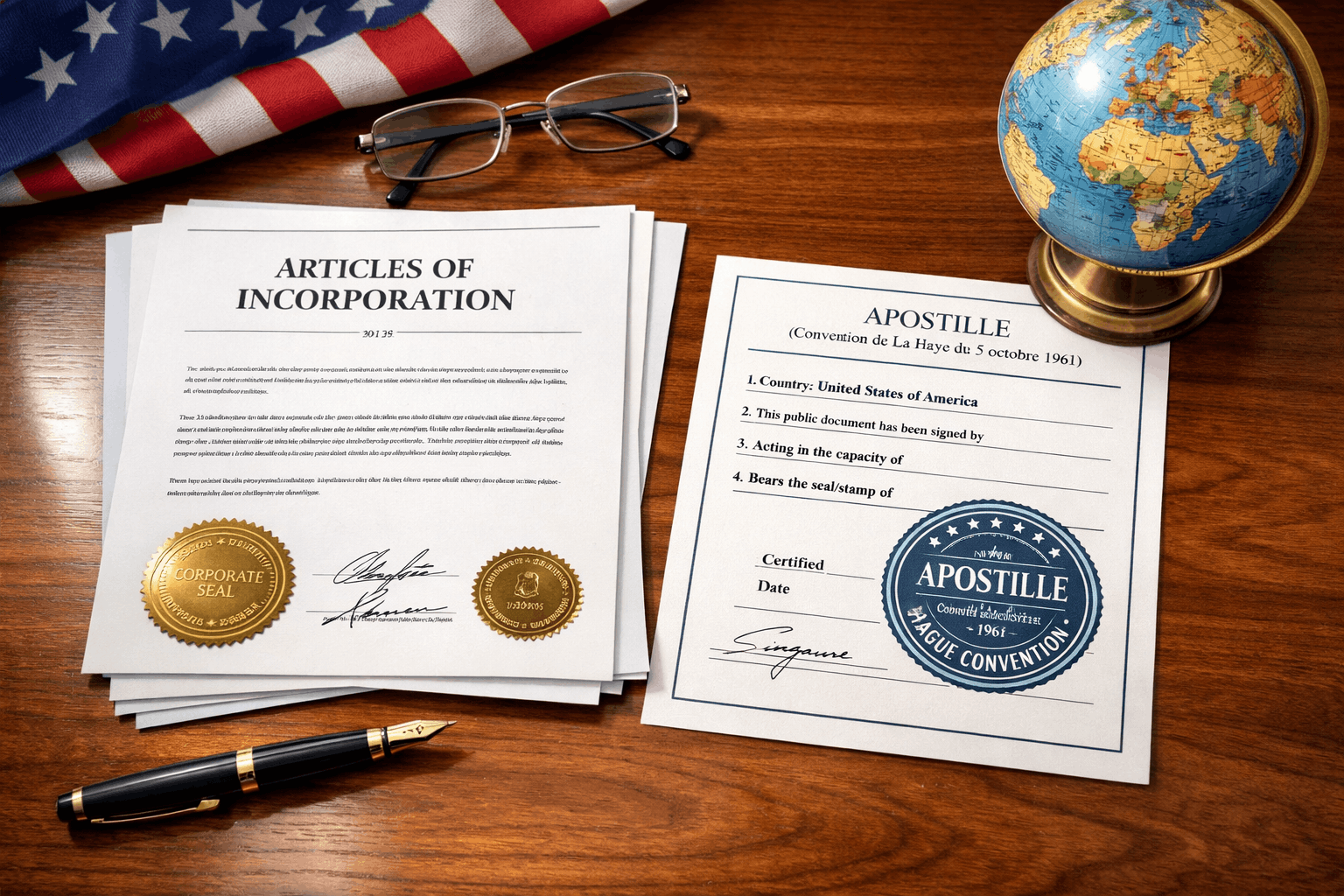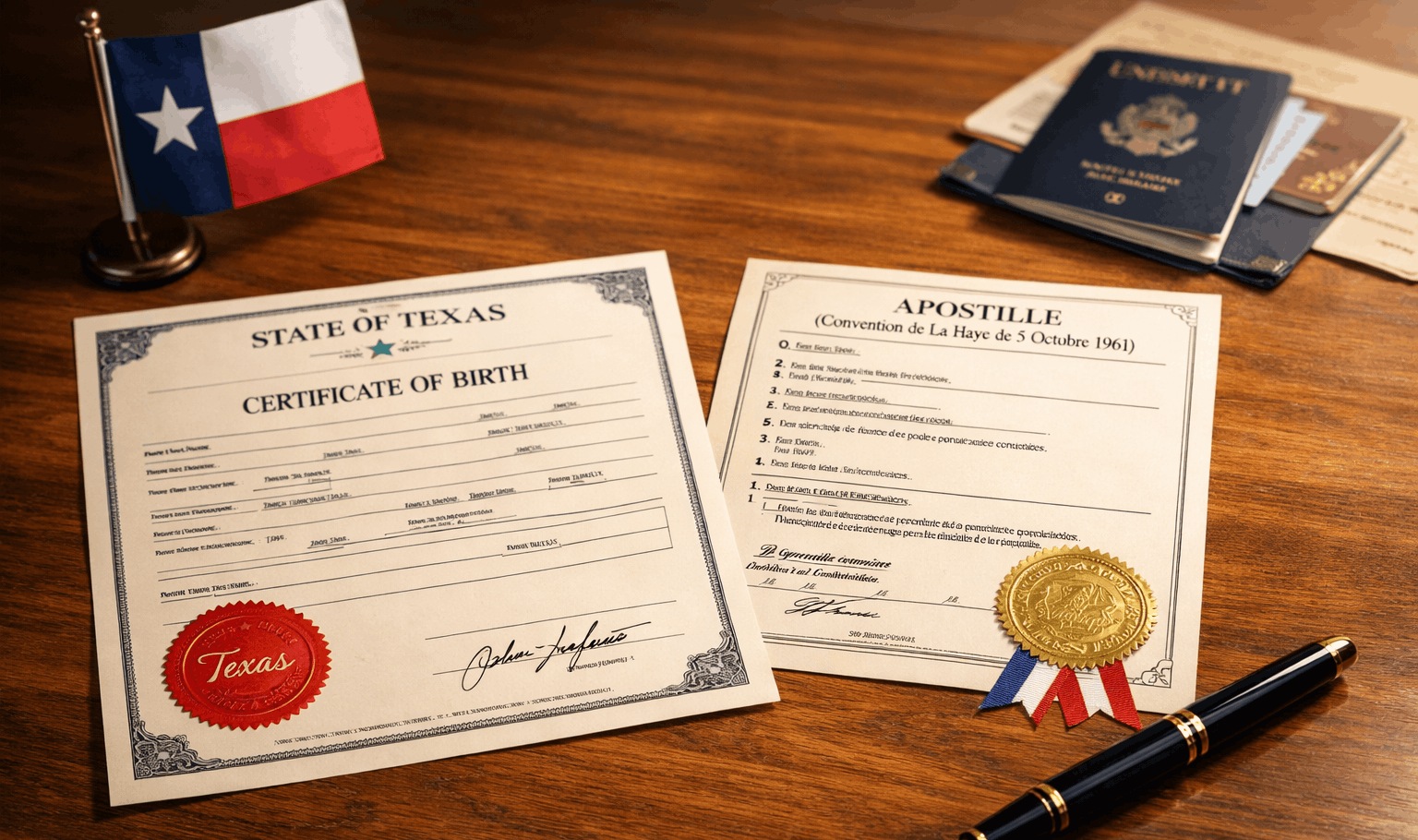
The Hague Apostille: What is it?
If you need to use a U.S. document abroad, it’s likely that the document requires an apostille to prove its authenticity. But what is a Hague apostille exactly? Our guide will explain this method for international document authentication, which is recognized in more than 120 countries worldwide. Let’s streamline your paperwork by making sense of the apostille process first!
Definition of the Hague Apostille
It’s essential to understand what a Hague Convention apostille is. This section will clarify the fundamentals so you have an overview of the apostille’s definition, legal framework, and how it streamlines global authentication processes.
What Is an Apostille Under the Hague Convention?
Generally, an apostille is a certificate introduced under the 1961 Hague Convention that authenticates public documents for legal use abroad. Distinguished from the traditional lengthy legalization process, it’s a simplified approval stamp in countries that are part of the treaty. From birth certificates to business contracts, the apostille certification validates these documents, so that foreign authorities accept them without issue.
Legal Scope and Function
The apostille serves as a standardized method for authenticating a document issued in one country for use in another. It ensures the legitimacy of paperwork by verifying the signature, seal, and the capacity of the signer. No more multi-step authentication or consular legalization — apostilled public documents are credible and recognized in all countries that have signed the Convention.
Origins and Legal Basis of the Hague Convention 1961
The Hague Convention revolutionized the bureaucratic nightmare of international document authentication by establishing a unified system for participating nations. The treaty, formally known as the Convention of 5 October 1961 Abolishing the Requirement of Legalisation for Foreign Public Documents, created a legal framework for validating public documents, enabling smoother transactions in both business and personal matters across borders.
The Convention was adopted to simplify and harmonize the complex legalization process, saving time and reducing costs for individuals and organizations engaged internationally. It entered into force on January 24, 1965, and today counts more than 120 contracting parties worldwide.
Characteristics of an Apostille Certificate
Not all apostilles look alike, but they follow standardized rules to ensure consistency among members. Whether looking at a U.S. or German apostille, you may notice similar features. Let’s explore how apostilles appear, which details are included, and how language requirements are met to fulfill global expectations.
Standardized Format
Apostilles adhere to the same layout prescribed by the Convention, allowing for instant recognition among member countries. The uniform format includes elements such as country, public official, confirmation, date and place of issue, issuing authority, reference number, and official signature and seal, offering reliability and quick verification for legal use of documents abroad.
Physical Appearance
An apostille takes the form of a stamp or, more typically, a separate page attached to the document. For universal presentation, it features the French title “Apostille”, followed by 10 numbered fields and concluded with a raised stamp. The look is simple yet formal, making it easy to identify for global authentication purposes. Some countries issue digital apostilles, also called e-Apostilles, available as PDF files with electronic signatures and QR codes for authenticity verification.
Language Requirements
While the content might be in the issuing country’s language, some authorities use a bilingual format that includes text in English to facilitate recognition. Additionally, the word “Apostille” along with the treaty’s official name “Convention de La Haye du 5 octobre 1961” must appear in French.
Which Documents Qualify for a Hague Apostille?
It might be usual to assume that any public documents are eligible for a Hague Convention apostille. However, the truth is that only certain records meet the criteria. This section will look at which types qualify for an apostille and which fall outside the scope. Knowing the difference saves you time and headaches!
Eligible Types of Public Documents
You can apostille documents issued by public agencies for personal and business matters, typically:
- Civil records: Birth, marriage, and death certificates
- Court orders: Divorce decrees, court rulings, and restraining orders
- Notarized statements: Powers of attorney and affidavits
- Government-issued licenses: Diplomas, professional licenses, and patents
- Business records: Registrations and articles of incorporation
All must be issued by an authorized entity with an original signature and stamp.
Documents That Cannot Be Apostilled
Private documents without certification from a public authority don’t qualify for apostilles. These include unofficial contracts, personal letters, as well as documents issued outside the U.S. Additionally, public records intended for use in non-Hague countries may require alternative authentication methods.
Legal Effect and Limitations
It’s important to understand the purpose of an apostille — and its boundaries — to use it correctly. This part will clarify what the apostille does and doesn’t do, and how long it stays valid for international acceptance. Here’s a breakdown!
Apostille Does Not Validate Content
Essentially, an apostille verifies three key points: the signature, the capacity of the issuing official, and the seal or stamp. The ultimate goal is to authenticate the document’s origin rather than its content. In short, the apostille confirms that your birth certificate is genuine, but the date of birth provided isn’t necessarily accurate. Don’t get confused between the document’s authenticity and content validity.
No Need for Embassy or Consulate Legalization
A major benefit of the apostille is that it doesn’t require additional legalization from the embassy or consulate of the destination country. Apostilles offer:
- Automatic acceptance in all Hague member countries
- No further state/federal authentication or consular legalization
- Minimized government office visits and bureaucratic loops
Check the member list first to find out if you can take advantage of an apostille.
Validity Period
The good news is that apostilles don’t expire. That said, some authorities may require a recent version for legal procedures. Since it depends on the receiving country and institution, always check the updated guidelines to ensure your apostilled documents fulfill their specific requirements regarding the issuing date.
Apostille vs. Legalization
Prior to the apostille, international document authentication was a tedious and time-consuming process involving multiple certification layers. We’ll uncover how the apostille process transforms the global paperwork landscape in this section.
What Legalization Meant Before the Hague Convention
Before 1961, documents had to be submitted to several domestic and foreign authorities for verification, typically involving:
- Notarization
- County and/or state authentication
- Federal authentication
- Consular legalization
This process could take months, and a minor mistake might cause you to start all over again and put a halt to your international journey.
How the Apostille Simplifies the Process
Since the Convention, apostille certification has replaced the former inefficient legalization chains, reducing the processing time for those who need to use their documents abroad quickly. With just a single-step apostille, document authentication becomes more accessible and relevant in our fast-moving world.
The Apostille in Practice
Now that you understand everything about the apostille in theory, how does it roll out in real life? We’ll explore some everyday apostille scenarios, how authorities validate them, and why they become indispensable in today’s globalized world.
Example Scenarios
Some regular situations you’ll need a Hague apostille include:
- Enrolling in a college or university overseas (diplomas and transcripts)
- Getting married abroad (birth certificates and affidavits of single status)
- Expanding a business to another country (powers of attorney)
- Accepting an international job offer (diplomas and FBI background checks)
Each scenario demands that you provide apostille certificates as proof of your document’s legitimacy.
How Authorities Verify Apostilles
Foreign officials check apostilles based on:
- The issuing country and authority, such as the California Secretary of State
- Security features, including original signatures and embossed seals
- Date and reference number matching with government databases
Some authorities now utilize online verification systems to check the apostille’s authenticity, instantly delivering results without the manual work.
The Apostille’s Role in a Globalized World
Apostilles are more crucial than ever in our interconnected world — they bridge the gap been domestic paperwork and international acceptance. Securing an apostille empowers you to move seamlessly for study or work, manage cross-border businesses without friction, and reach personal milestones swiftly. Start the process today to make your adventure abroad all smooth sailing!
FAQs About the Hague Apostille
What is the purpose of a Hague apostille?
It validates the signature and seal of a document for international use in Hague Convention nations without having to go through multiple verification processes.
Is a Hague apostille the same as legalization?
No, they are different. The apostille simplifies international document authentication by eliminating legalization for document use in countries that have signed the treaty.
Does an apostille expire?
No, it doesn’t. However, certain countries may require a recent apostille depending on the document’s age, especially if the issuing authority’s signature or seal is unverifiable.
Can any document be authenticated with a Hague apostille?
No, not all documents meet the apostille criteria. Only public documents like birth certificates or powers of attorney are eligible. Private ones don’t qualify.
Do all countries accept apostilles?
No, only members of the 1961 Hague Convention recognize the apostille. Non-members typically require the traditional authentication/legalization method.
What does a Hague apostille look like?
A stamp or a single-page certificate that is affixed to the document. It has a title “Apostille” with 10 numbered fields detailing information such as the origin, reference number, signatory, and seal.
Is an apostille accepted digitally?
While digital apostilles have been around for some time, acceptance depends on the destination country’s regulations. It’s best to double-check with the country or institution and obtain a paper-based apostille if necessary to avoid complications.





